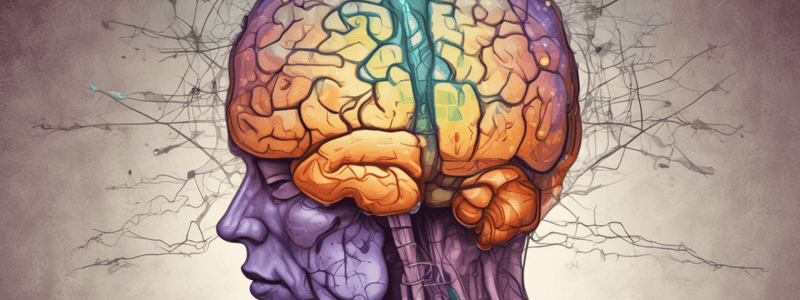Podcast
Questions and Answers
What is the main consequence of disruption of the blood-brain barrier in Traumatic Brain Injury?
What is the main consequence of disruption of the blood-brain barrier in Traumatic Brain Injury?
- Improved microcirculatory flow and decreased blood viscosity
- Elevated intracranial pressure and poor neurologic outcomes (correct)
- Local inflammation and altered cellular metabolism
- Increased cerebral perfusion pressure
What is the goal of ICP management in Traumatic Brain Injury?
What is the goal of ICP management in Traumatic Brain Injury?
- Achieve a CPP of 80-90 mmHg
- Maintain a GCS score of 8-10
- Maintain a CPP of 60-70 mmHg (correct)
- Maintain an ICP of 25-30 mmHg
What is the primary mechanism of action of Mannitol in reducing ICP?
What is the primary mechanism of action of Mannitol in reducing ICP?
- Decreasing blood viscosity
- Increasing microcirculatory flow
- Increasing MAP and decreasing ICP simultaneously
- Creating an osmotic gradient (correct)
What is a predictor of poor outcomes in Traumatic Brain Injury?
What is a predictor of poor outcomes in Traumatic Brain Injury?
What is the advantage of Hypertonic Saline over Mannitol?
What is the advantage of Hypertonic Saline over Mannitol?
What is the recommended duration for seizure prophylaxis in Traumatic Brain Injury?
What is the recommended duration for seizure prophylaxis in Traumatic Brain Injury?
What type of hemorrhage occurs between the dura and arachnoid mater?
What type of hemorrhage occurs between the dura and arachnoid mater?
What is the primary goal of Hyperosmolar Therapy?
What is the primary goal of Hyperosmolar Therapy?
What is a common adverse effect of Mannitol therapy?
What is a common adverse effect of Mannitol therapy?
What is the most significant risk factor for early posttraumatic seizures within 7 days of injury?
What is the most significant risk factor for early posttraumatic seizures within 7 days of injury?
Which antiepileptic medication is commonly used for preventing seizures in TBI patients, despite having a lower safety profile?
Which antiepileptic medication is commonly used for preventing seizures in TBI patients, despite having a lower safety profile?
What is the recommended duration of antiepileptic therapy for TBI patients?
What is the recommended duration of antiepileptic therapy for TBI patients?
Which of the following is NOT a predictor of DVT in TBI patients?
Which of the following is NOT a predictor of DVT in TBI patients?
What is the mechanism of action of Propofol in reducing ICP?
What is the mechanism of action of Propofol in reducing ICP?
What is a potential complication of Propofol infusion?
What is a potential complication of Propofol infusion?
When is Pentobarbital typically used in TBI patients?
When is Pentobarbital typically used in TBI patients?
What is the benefit of Levetiracetam in TBI patients?
What is the benefit of Levetiracetam in TBI patients?
What is the timing of VTE prophylaxis in TBI patients?
What is the timing of VTE prophylaxis in TBI patients?
Flashcards are hidden until you start studying
Study Notes
Traumatic Brain Injury (TBI)
- Alteration in brain function or evidence of brain pathology caused by an external force
Types of Hemorrhage
- Extra-axial hemorrhage: Epidural hematoma (EDH), Subdural hematoma (SDH), Subarachnoid hemorrhage (SAH)
- Intra-axial hemorrhage: Diffuse axonal injury (DAI), Intraventricular hemorrhage (IVH), Intracerebral hemorrhage (ICH)
Primary and Secondary Injury
- Primary injury: Initial injury caused by external force
- Secondary injury: Result of subsequent cellular and molecular responses
Predictors of Poor Outcomes
- Elevated ICP
- Herniation
- Absent cough and gag reflexes
- Low GCS scores
- Over breathing the ventilator
Hyperosmolar Therapy
- Goals: Maintain cerebral perfusion pressure (CPP), provide adequate blood flow to brain
- CPP = MAP – ICP, Goal CPP: 60-70 mmHg, Goal ICP: < 22 mmHg
Mannitol and Hypertonic Saline
- Mannitol: Osmotic diuretic, decreases blood viscosity, increases microcirculatory flow
- Adverse effects: Hypernatremia, Hypovolemia, Renal dysfunction
- Hypertonic Saline: Increases MAP, decreases ICP, improves CPP
- Monitoring: serum sodium levels, renal function
- Adverse effects: Hypernatremia
Comparison of Mannitol and Hypertonic Saline
- ICP reduction onset: Mannitol < 5 min, Hypertonic Saline 15-30 min
- ICP reduction duration: Mannitol up to 12 hrs, Hypertonic Saline 1.5-6 hrs
- Rebound effect: Mannitol none, Hypertonic Saline possible
- Diuretic effect: Mannitol none, Hypertonic Saline yes, ↓MAP
Early Seizure Prophylaxis
- Recommended to prevent early post-traumatic seizures within 7 days of injury
- Risk factors: GCS < 10, Immediate seizures, Subdural, epidural, or intracerebral hematoma, Post-traumatic amnesia lasting longer than 30 mins, Cortical contusion, Linear or depressed skull fracture, Age < 65 years, Penetrating head injury, Chronic alcoholism
Antiepileptic Therapy
- Phenytoin: Most data to support its use, not used as often, Monitoring: dose titrated based on phenytoin levels, not as well tolerated as levetiracetam, more sedating
- Levetiracetam: Used more commonly, shown to be as effective as phenytoin in preventing seizures, benefits: improved safety profile, easy administration, few DDI, safe in pregnancy, no drug monitoring required, 1:1 IV to PO conversion
Duration of Therapy
- 7 days post TBI
VTE Prophylaxis
- Background: High risk for VTE due to hypercoagulable state from primary brain injury, periods of prolonged immobilization, focal motor deficits
- Predictors of DVT: Age, SAH, ISS > 15, Extremity injury
- Agents: Compression devices (SCDs), graduated compression stockings, LMWH or low-dose UFH
- Timing: LMWH or UFH within 24-48 hr from stable head CT
Other Agents
- Propofol: Sedative of choice in TBI patients, decreases ICP, rapid onset, short duration, possible neuroprotective effects, no mortality benefit, no effects on neurological improvement
- Monitoring: Triglyceride levels, Propofol related infusion syndrome (PRIS)
- Pentobarbital: Not a 1st line agent, elevated ICP refractory to other agents, barbiturate coma, concern
Studying That Suits You
Use AI to generate personalized quizzes and flashcards to suit your learning preferences.




